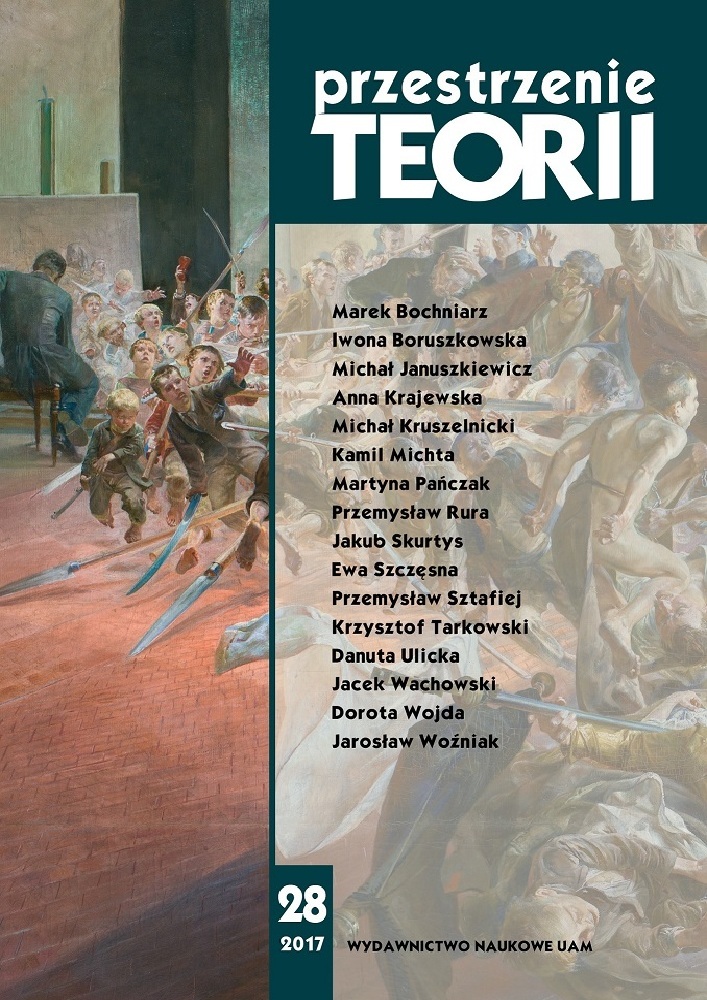Abstract
The article is an attempt to answer the question: what happens to a literary work – understood as Ingarden’s purely intentional objects – from the recipient’s perspective? And also: how do the images of objects arise in the minds of the audience and what are their properties? Transferring purely intentional objects to the recipient’s perspective changes their status: mental images of objects are subject to numerous fluctuations (based on emotions and cognitive processes). In this way they are transformed into forms that are non-permanent reflections of objects belonging to a literary work. Referring to Ingarden’s terminology, one might say that they become purely intentional reflections (or reflections of purely intentional objects). The article is an attempt to characterize and stratify them.
References
Annas J., An Introduction to Plato’s Republic, Oxford 1981.
Arnheim R., Myślenie wzrokowe, tłum. M. Przylipiak, Gdańsk 2011.
Arystoteles, Poetyka 1450a, 25, tłum. H. Podbielski, BN seria II, nr 209, Wrocław 1983.
Austin J.A., Jak działać za pomocą słów, [w:] tegoż, Mówienie i poznawanie, tłum. J. Woleński, Warszawa 1993, s. 550–708.
Axer J., Filolog w teatrze, Warszawa 1991.
Brentano F., Psychologia z empirycznego punktu widzenia, tłum. W. Galewicz, Warszawa 1999.
Chrudzimski A., Intentionalität, Zeitbewusstsein und Intersubjektivität. Studien zur Phänomenologie von Brentano bis Ingarden, Frankfurt 2005.
Chrudzimski Z., Teoria intencjonalności Romana Ingardena, „Edukacja Filozoficzna” 1998, 25, s. 249–262.
Damasio A., Błąd Kartezjusza. Emocje, rozum i ludzki mózg, tłum. M. Karpiński, Poznań 2011.
Damasio A., Jak umysł zyskał jaźń. Konstruowanie świadomego mózgu, tłum. N. Radomski, Poznań 2011.
Genette G., Palimsestes. La literature au second degre, Paris 1982.
Heidegger M., Kant a problem metafizyki, tłum. B. Baran, Warszawa 1989.
Hopensztand D., Mowa pozornie zależna w kontekście „Czarnych skrzydeł”, [w:] Stylistyka teoretyczna w Polsce, red. K. Budzyk, Warszawa 1946.
Husserl E., Vorlesungen über Bedeutungslehre. Sommersemester 1908, (Husserliana XXVI, hrsg. von U. Panzer), Dordrecht 1986.
Ingarden R., O dziele literackim, Warszawa 1960.
Ingarden R., O pytaniach esencjalnych, [w:] tegoż, Z teorii języka i filozoficznych podstaw logiki, Warszawa 1972.
Ingarden R., Studia z estetyki, t. 1, Warszawa 1956.
Ingarden R., Z badań nad filozofią współczesną, Warszawa 1963.
Krokos J., Odsłanianie intencjonalności, Warszawa 2013, s. 19.
Kristeva J., Semiotique. Recherches pour une semanalise, Paris 1969.
Lem S., Filozofia przypadku. Literatura w świetle empirii, Kraków 1968.
Meinong A., „Über Gegenstandstheorie”, in Gesamtausgabe, Graz 1971, s. 481–535.
Münch D., Intention und Zeichen. Untersuchungen zu Franz Brentano und zu Edmund Husserls Frühwerk, Frankfurt am Main 1993.
Novotny H., Scott P., Gibbson M., Re-Thinking Science: Knowledge and the Public in an Age of Uncertainty, Cambridge 2001.
Sachs-Hombach K., Philosophische Psychologie im 19. Jahrhundert. Ihre Ent – stehung und Problemgeschichte, Freiburg-München,1993.
Rumelhart D.E., The architecture of mind. A connectionist approach, [w:] Foundation of Cognitive Science, red. M.J. Posner, Boston 1993, s. 133–159.
Szczepańska A., Estetyka Romana Ingardena, Warszawa 1989.
Wawrzyniak A., Egzystencja, [w:] Powszechna encyklopedia filozofii, red. A. Maryniarczyk, t. 3, Lublin 2002, s. 33–34.
Wróbel Ł., Intencjonalność i referencja. Ku fenomenologii form gatunkowych. „Teka Komisji Polsko-Ukraińskich Związków Kulturowych”, Lublin 2009, z. 4, s. 44–45.
License
Authors
Authors of texts accepted for publication in Przestrzenie Teorii are required to complete, sign and return to the editor's office the Agreement for granting a royalty-free license to works with a commitment to grant a CC sub-license.
Under the agreement, the authors of texts published in Przestrzenie Teorii grant the Adam Mickiewicz University in Poznań a non-exclusive, royalty-free license and authorize the use of Attribution-NonCommercial-NoDerivatives 4.0 International (CC BY-NC-ND 4.0) Creative Commons sub-license.
The authors retain the right to continue the free disposal of the work.
Users
Interested Internet users are entitled to use works published in Przestrzenie Teorii since 2015, for non-commercial purposes only, under the following conditions:
- attribution - obligation to provide, together with the distributed work, information about the authorship, title, source (link to the original work, DOI) and the license itself.
- no derivatives - the work must be preserved in its original form, without the author's consent it is not possible to distribute the modified work, such as translations, publications, etc.
Copyrights are reserved for all texts published before 2015.
Miscellaneous
Adam Mickiewicz University in Poznań retains the right to magazines as a whole (layout, graphic form, title, cover design, logo etc.).
